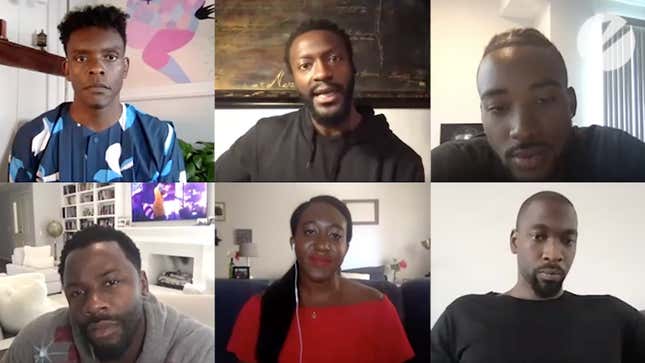
As we’ve witnessed throughout the past few months, Hollywood is in the midst of a racial reckoning—or at least, starting to have that conversation on an unprecedented scale.
As part of Variety’s #Represent series, Aldis Hodge, Jay Pharoah, Algee Smith, Derek Luke and Chris Chalk got candid about their experiences with racism in Hollywood in an eye-opening “Black Men in Hollywood” roundtable.
One particular standout moment in the discussion centered around portraying Black pain. Whether it’s slavery or police brutality, the actors warred with accepting roles that dealt with such topics, continuing an ongoing discussion/debate around broadcasting Black trauma. Since some Black audiences have fatigue around slave narratives, should we move away from those? Should we still tell these types of narratives, as we haven’t truly scratched the surface (particularly given the fact that many of the narratives are led by white voices)? Or as in perhaps the most recent example of discussing Queen & Slim, does chronicling Black violence serve Black audiences in any way (there is an argument in favor of highlighting awareness), or are these films and television shows mainly just trauma porn for white audiences? And is this issue exacerbated by the fact that we don’t have the privilege of having an actual balance of Black narratives (and their wide range) to satisfy every appetite?
Smith opened up about the pressures in portraying heavy roles in films such as Detroit and The Hate U Give, each of which chronicles extreme violence against Black people, including police brutality.
“I was obviously in a very emotional place. However, it was a very honest place,” Smith recalled. “I feel like I’ve played so many roles where I’ve either died as a young black teenager or where it’s been something that hasn’t been edifying a black teenager or a black man at all. And so, I was like, for myself, I’m tired of playing those roles and I said ‘I’m done with it.’”
“I had to take Ambien while I was shooting Detroit because I couldn’t sleep,” he continued. “But you do it for a reason. That’s why we are actors, that’s why we put ourselves in that position, to feel for people.”
“My frustration with the industry was that what was normal and what was actually real was not being portrayed. A small percentage of what the Black culture experiences was being portrayed to the masses as the totality of our definition as a culture,” Hodge said. “It was really disheartening. So, I said, ‘Look, I’m not doing any of this anymore.’ Took a stance. Of course, you lose a couple of jobs, you sacrifice a little bit, [but] it’s all good, because it pushes your career, drives your career to a very specific point.”
“And then, as I got older, there are opportunities that came my way that were challenging,” he says. “When Underground came around, and I said, ‘How do we watch five or six seasons of our pain?’ But then, when I read it, and I saw how it was distributed and I said, “Oh, there’s a difference here,’” Hodge continued.
Speaking of the era that Underground highlights, Luke noted that the idea of portraying a slave was difficult for him, as it would essentially re-traumatize him.
“I said I would never play a slave,” Luke said. “My instinct was that it was traumatic enough being in my skin. It was traumatic enough coming to Hollywood and having to come through playing a thug or a gangster role and my spiritual lens was always like, ‘How do I navigate in a space that may reject my race?’”
However, Chalk offered another perspective, noting that if we don’t tell our own stories fully (and with all the rawness that includes), we’re left risking our history being erased or bastardized by white voices.
“I was doing some workshops in a school, and the [history] book never said ‘slavery,’ it said ‘indentured servitude.’ So, if we don’t tell our story, they’re going to change that story,” Chalk said. “I want the world to see what we have survived. I want the world to know the knees on our neck. And I’m grateful to take the weight of that.”
To watch the full roundtable interview, head to variety.com.

